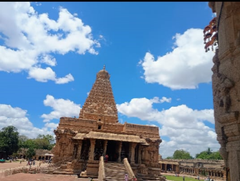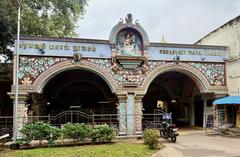Tamil University Thanjavur Visiting Hours, Tickets, and Historical Sites Guide
Date: 03/07/2025
Introduction
Tamil University, located in Thanjavur, Tamil Nadu, is a premier institution devoted to the preservation, study, and promotion of Tamil language, literature, and culture. Established in the early 1980s after decades of advocacy by Tamil scholars and political leaders, the university has become both an academic powerhouse and a cultural destination. Its sprawling campus, architectural elegance, rare collections, and vibrant events make it an essential stop for tourists, researchers, and anyone interested in South Indian heritage (Tamil University Official Site; Wikipedia).
This comprehensive guide offers a detailed overview of Tamil University’s history, visitor information, campus attractions, and tips for making the most of your visit, as well as recommendations for nearby Thanjavur historical sites.
Table of Contents
- Introduction
- Historical Background and Establishment
- Visiting Tamil University: Practical Information
- Campus Highlights and Attractions
- Cultural Significance
- Visitor Tips
- Frequently Asked Questions (FAQ)
- How to Reach Tamil University
- Contact Information
- Summary and Final Tips
- References
Historical Background and Establishment
Vision and Early Advocacy
The idea for a university dedicated to Tamil studies was conceived as early as 1925 by leading Tamil scholars. Their vision was to create a research-focused institution to safeguard and promote Tamil civilization’s heritage. This aspiration gained momentum with the rise of the Dravidian movement and growing recognition of Tamil’s global significance (Tamil University Official Site).
Legislative Foundation
In 1981, Dr. M.G. Ramachandran, then Chief Minister of Tamil Nadu, announced the founding of Tamil University at the Fifth World Tamil Conference. Thanjavur was chosen as the location, given its historical status as the heart of Tamil art and culture. The Tamil Nadu State Assembly soon passed the Tamil University Act (Act No. 9 of 1982), and the University Grants Commission formally recognized the institution in 1985 (CollegeDekho; SuccessCDs).
Expansion and Academic Programs
Tamil University began as a research-driven institution focusing on language, literature, archaeology, and the arts. Over time, it introduced postgraduate, M.Phil., and Ph.D. programs, and later, the Directorate of Distance Education to broaden access. Today, it offers over 130 courses in arts, sciences, culture, and modern fields like GIS and remote sensing (CollegeDekho).
Campus and Architecture
Spread across nearly 900 acres, Tamil University’s campus is the largest in Tamil Nadu. Its buildings blend traditional Tamil motifs—such as the gopuram-inspired administrative block—with modern facilities. Key structures include the Parliament-inspired library, Karikalan Gallery, hostels, sports grounds, and a healthcare center (Wikipedia; CollegeDekho).
Recognition and Collaborations
The university holds a B+ NAAC grade and collaborates with institutions like the International Institute of Tamil Studies and the Pondicherry Institute of Linguistics and Culture, fostering a vibrant research environment (SuccessCDs).
Visiting Tamil University: Practical Information
Visiting Hours and Entry
- General Hours: 9:00 AM to 5:00 PM, Monday to Saturday
- Closed: Sundays, public holidays, and during examination periods
- Entry: Free for general visitors. Some attractions (museum, galleries) may charge a nominal fee (INR 30 for Indian visitors, INR 100 for international visitors).
Guided Tours and Events
- Guided Tours: Available on advance request; ideal for groups and academic visitors.
- Special Events: Annual cultural festivals, World Tamil Conference events, and public lectures are open to visitors. Check the official website for schedules.
Accessibility and Facilities
- Accessibility: Wheelchair ramps, accessible pathways, and reserved parking are available.
- Parking: Ample on-campus parking for private vehicles.
- Restrooms: Clean restrooms and drinking water facilities at major buildings.
- Food: Campus canteen offers South Indian cuisine. Wider food options are available in Thanjavur city.
Campus Highlights and Attractions
Major Attractions
- Administrative Block: Notable for its grand gopuram design.
- Library and Manuscript Section: Houses over 500,000 books and rare palm-leaf manuscripts. Some collections require advance permission for access.
- Museum: Features artifacts, ancient manuscripts, coins, and musical instruments, offering insights into Tamil art and history (Adventure Backpack).
- Sculpture Garden: Life-sized statues of deities, poets, and historic figures; a favorite spot for photography (Tusk Travel).
- Karikalan Gallery: Exhibition space for Tamil history and culture.
- Cultural Museum: Showcases daily life, traditional costumes, and rituals of Tamil Nadu.
- Botanical Garden: Features indigenous flora; guided nature walks highlight the role of plants in Tamil culture.
- Open-Air Auditorium: Venue for dance, music, and cultural performances.
Best Photographic Spots
- The gopuram-style administrative block
- The Parliament-inspired library
- Karikalan Gallery and campus gardens
Cultural Significance
Tamil University is a living center of Tamil identity, hosting research, documentation, and preservation of language, literature, and intangible heritage. It organizes literary meets, festivals, and arts workshops, supporting both scholarly pursuits and community engagement. Its extension programs promote Tamil learning in schools and rural communities, while international collaborations foster a cosmopolitan academic environment (Tusk Travel; Adventure Backpack).
Visitor Tips
- Best Time to Visit: October to March for pleasant weather and cultural events.
- Dress Code: Modest, comfortable clothing recommended.
- Photography: Permitted in outdoor and sculpture areas; seek permission for indoor or research zones.
- Advance Booking: Recommended for guided tours and event tickets, especially during peak season.
- Travel Essentials: Wear comfortable footwear, carry water, and protect against the sun during summer months.
Frequently Asked Questions (FAQ)
Q: What are Tamil University’s visiting hours?
A: 9:00 AM to 5:00 PM, Monday to Saturday; closed on Sundays and public holidays.
Q: Do I need a ticket to enter?
A: General entry is free; certain attractions may charge a small fee.
Q: Are guided tours available?
A: Yes, by prior arrangement through the visitor center or administration.
Q: Is the campus accessible for visitors with disabilities?
A: Yes, most major buildings have ramps and accessible facilities.
Q: Can I take photographs?
A: Photography is allowed in outdoor areas; permission is needed for indoor spaces.
Q: What notable sites are nearby?
A: Brihadeeswarar Temple, Thanjavur Palace, and Saraswathi Mahal Library are all within a short distance.
How to Reach Tamil University
- By Air: Tiruchirappalli International Airport (60 km away)
- By Train: Thanjavur Railway Station (well-connected to major cities)
- By Road: Regular bus and taxi services from Thanjavur city center; the university is about 7–10 km from town (Shiksha)
Contact Information
- Address: Tamil University, Tamil University Road, Thanjavur – 613010, Tamil Nadu, India
- Phone: +91 4362 226720
- Email: [email protected]
- Website: tamiluniversity.ac.in
For current visiting hours, event details, and guided tour bookings, consult the official university website.
Summary and Final Tips
Tamil University in Thanjavur is a unique intersection of academic achievement and living heritage. Its expansive campus, rare collections, and cultural programming offer an immersive experience for visitors interested in Tamil civilization. Free general entry, accessible facilities, and proximity to Thanjavur’s iconic landmarks make it an ideal addition to any itinerary in South India. Always confirm visiting hours and event schedules in advance, and consider using digital tools like the Audiala app for up-to-date travel tips and cultural insights.
References
- Tamil University Official Site
- Wikipedia
- CollegeDekho
- SuccessCDs
- Adventure Backpack
- Tusk Travel
- Shiksha
For more information on Thanjavur’s historical sites, see:


